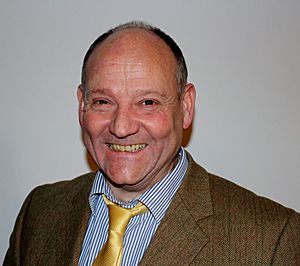Russell Foster facts for kids
Quick facts for kids
Russell Foster
|
|
|---|---|
 |
|
| Born | 19 August 1959 |
| Nationality | British |
| Alma mater | University of Bristol |
| Awards | Honma Prize (Japan), David G. Cogan Award (USA), Zoological Society Scientific and Edridge-Green Medals (UK) |
| Scientific career | |
| Fields | Neuroscience |
| Institutions | University of Oxford |
| Thesis | An investigation of the extraretinal photoreceptors mediating photoperiodic induction in the Japanese quail (Coturnix coturnix japonica) (1978) |
| Academic advisors | Brian Follett |
Russell Grant Foster, born in 1959, is a British professor. He studies how our bodies tell time, which is called circadian neuroscience. He works at the University of Oxford.
Professor Foster is known for helping discover special cells in the eye. These cells are not the usual rods or cones that help us see. Instead, they are photosensitive retinal ganglion cells (pRGCs). These pRGCs help our bodies know if it's day or night. This information is important for our circadian rhythm, which controls our sleep and wake cycles.
Since 2018, he has been the main editor for the Interface Focus journal, which is part of the Royal Society.
Contents
About Russell Foster
His Early Life and Education
Russell Foster was born in Aldershot, England. He went to Heron Wood School there. He later studied at the University of Bristol. In 1980, he earned his first degree in Zoology, which is the study of animals.
He continued his studies at the University of Bristol. In 1984, he received his PhD. His research was about how light affects Japanese quails. He studied how their bodies reacted to different amounts of light.
His Career Journey
From 1988 to 1995, Professor Foster worked in the United States. He was at the National Science Foundation Center for Biological Rhythms at the University of Virginia. There, he worked closely with another scientist named Michael Menaker.
In 1995, he returned to the UK. He started his own research lab at Imperial College London. Later, he moved his lab to the University of Oxford. At Oxford, he focused on research that could be used to help people directly.
His Scientific Discoveries
The Body's Main Clock
While at the University of Virginia, Professor Foster and Michael Menaker did important experiments. They studied a part of the brain called the suprachiasmatic nucleus (SCN). The SCN is like the body's main clock.
They took the SCN from hamsters with a fast body clock and put it into hamsters with a normal clock. They also did the opposite. They found that the hamsters always ended up with the body clock of the hamster that donated the SCN. This showed that the SCN is essential for controlling our daily rhythms.
How Light Affects Our Body Clock
In 1991, Professor Foster and his team found something surprising. They showed that the usual rods and cones in our eyes are not the only things that help our body clock react to light. Rods and cones are the cells that help us see images.
They studied mice that had damaged rods and cones. Even without these cells, the mice's body clocks still reacted to light. This meant there had to be other cells in the eye that sense light for the body clock.
Later, in 1999, he continued this research. He found that even mice with almost no rods or cones could still tell day from night. However, mice with no eyes at all could not. This proved that the eye contains other special light-sensing cells. These cells were later identified as photosensitive retinal ganglion cells (pRGCs). They contain a light-sensitive protein called melanopsin.
Books He Has Written
Professor Foster has written several books to share his knowledge with everyone. He co-authored two books about body rhythms with Leon Kreitzman:
- Rhythms of Life: The Biological Clocks that Control the Daily Lives of Every Living Thing
- Seasons of Life: The Biological Rhythms That Enable Living Things to Thrive and Survive
He also co-wrote a book called Sleep: a Very Short Introduction. In addition, he wrote Life Time: The New Science of the Body Clock, and How It Can Revolutionize Your Sleep and Health.
Awards and Recognitions
Professor Foster has received many awards for his important discoveries.
In 2008, he was chosen as a fellow of the Royal Society. This is a very high honor for scientists in the UK. In 2015, he was made a Commander of the Order of the British Empire (CBE) for his contributions to science.
In 2020, he received The Daylight Award. This award recognized his studies on how light affects humans.
Some of His Main Awards
- Honma Prize (Japan, 1997)
- David G. Cogan Award (USA, 2001)
- Zoological Society Scientific Medal (UK, 2000)
- Edridge Green Medal (Royal College of Ophthalmologists, UK, 2005)
- Peter C. Farrell Prize in Sleep Medicine (2015)
- Nikken International Science Award (2015)
- The Daylight Award (2020)
 | Delilah Pierce |
 | Gordon Parks |
 | Augusta Savage |
 | Charles Ethan Porter |

